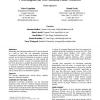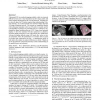318 search results - page 59 / 64 » Recognizing and Tracking Human Action |
PUC
2010
13 years 8 months ago
2010
Human computer interaction (HCI) has little explored everyday life and enriching experiences in rural, wilderness and other predominantly ‘‘natural’’ places despite their s...
CHI
2003
ACM
14 years 10 months ago
2003
ACM
Historically, the dominant paradigm in HCI, when it appeared as a field in early 80s, was information processing ("cognitivist") psychology. In recent decades, as the fo...
JOCN
2011
13 years 4 months ago
2011
■ Agency attribution is a hallmark of mind perception; thus, diminished attributions of agency may disrupt social–cognition processes typically elicited by human targets. The ...
ISMAR
2009
IEEE
14 years 4 months ago
2009
IEEE
Ultrasound (US) is a medical imaging modality which is extremely difficult to learn as it is user-dependent, has low image quality and many artifacts that depend on the viewing d...
INTETAIN
2005
Springer
14 years 3 months ago
2005
Springer
First person games are computer games, in which the user experiences the virtual game world from an avatar’s view. This avatar is the user’s alter ego in the game. In this pape...


